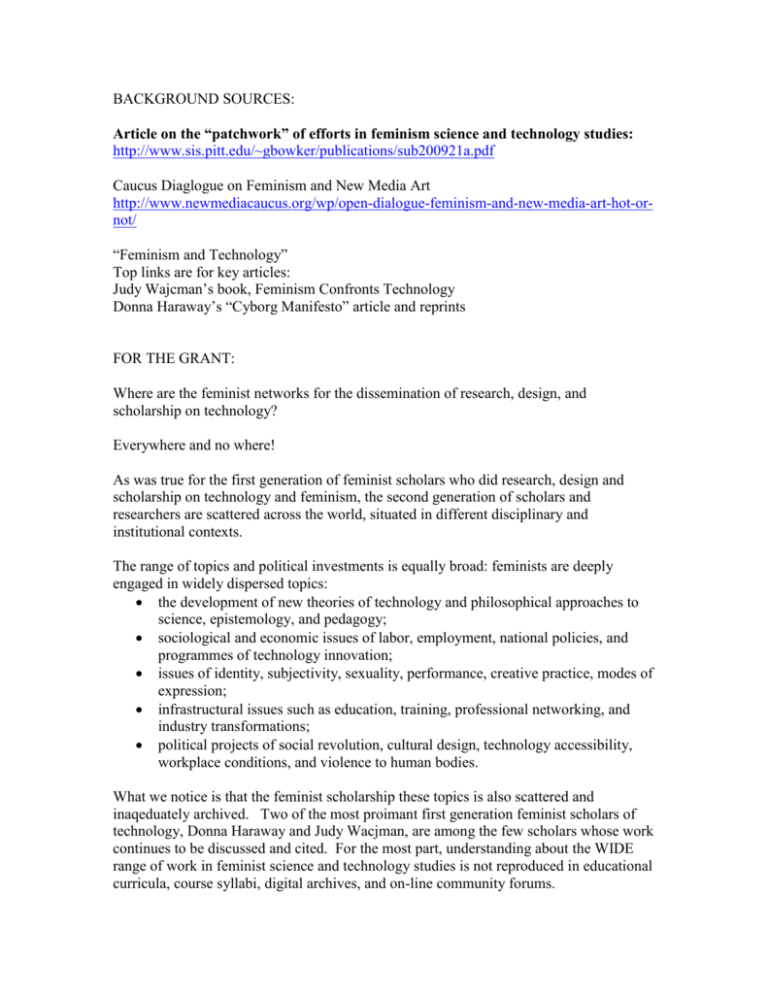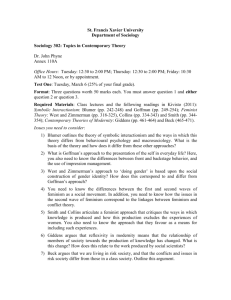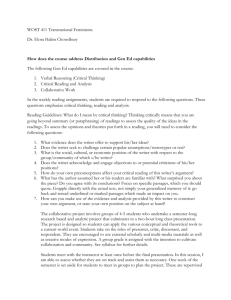organized feminist
advertisement

BACKGROUND SOURCES: Article on the “patchwork” of efforts in feminism science and technology studies: http://www.sis.pitt.edu/~gbowker/publications/sub200921a.pdf Caucus Diaglogue on Feminism and New Media Art http://www.newmediacaucus.org/wp/open-dialogue-feminism-and-new-media-art-hot-ornot/ “Feminism and Technology” Top links are for key articles: Judy Wajcman’s book, Feminism Confronts Technology Donna Haraway’s “Cyborg Manifesto” article and reprints FOR THE GRANT: Where are the feminist networks for the dissemination of research, design, and scholarship on technology? Everywhere and no where! As was true for the first generation of feminist scholars who did research, design and scholarship on technology and feminism, the second generation of scholars and researchers are scattered across the world, situated in different disciplinary and institutional contexts. The range of topics and political investments is equally broad: feminists are deeply engaged in widely dispersed topics: the development of new theories of technology and philosophical approaches to science, epistemology, and pedagogy; sociological and economic issues of labor, employment, national policies, and programmes of technology innovation; issues of identity, subjectivity, sexuality, performance, creative practice, modes of expression; infrastructural issues such as education, training, professional networking, and industry transformations; political projects of social revolution, cultural design, technology accessibility, workplace conditions, and violence to human bodies. What we notice is that the feminist scholarship these topics is also scattered and inaqeduately archived. Two of the most proimant first generation feminist scholars of technology, Donna Haraway and Judy Wacjman, are among the few scholars whose work continues to be discussed and cited. For the most part, understanding about the WIDE range of work in feminist science and technology studies is not reproduced in educational curricula, course syllabi, digital archives, and on-line community forums. There are a couple of notable exceptions: The Society of History of Technology has a Special Interest Group on Women in Technology (http://women-in-technological-history.net/) The website maintained by WITH (Women in Technological History): includes an archive of bibliographies, conference listings, email discussions, publications, and syllabi, links. The email lists do not seem very active; and there is no sense in which the digital portal is a place for active community discussion and engagement. In a similar way, the Geek Feminism Wiki http://geekfeminism.wikia.com/wiki/Geek_Feminism_Wiki has created more than 600 articles since 2008 that include short posts about gender in different contexts: i.e., Gaming, anime fandom, blogging, cosplay, science. Not especially well documented citations and references. This seems like a fan-based site of scatter-shot topics. There are several sites dedicated to specific projects on the topic of feminism and technology, or, more commonly, women and technology. Of these, the Anita Borg Institute for Women in Technology is probably the best known and best funded. It grew out of Anita Borg’s early email list called “systers” that was (initially) a small list of women who worked in IT companies (mostly in Silicon Valley) as system’s administrators. Borg founded the Institute for Women in Technology in the early 2000s to grow the SYSTERS effort to provide a network for women in computing. After Borg died in 2003, the Institute was renamed and holds this mission statement: Anita Borg Institute for Women and Technology http://anitaborg.org/ MISSION Statement: Connecting Women and Technology We are women technologists. We use technology to connect our communities. We create technology because it is who we are — intelligent, creative and driven. We lead with compassion and a belief in inclusion. We develop competitive products and find solutions to problems that impact our lives, our nation, our world. Together, through the Anita Borg Institute for Women and Technology (ABI), we are inventing a better future. Working with men that believe in our mission, we are changing the world for women and technology. The Anita Borg Institute coordinates several annual events: 1) Women of Vision Awards: Honors women making significant contributions to technology. 3 winners: innovation, leadership, social impact 2) Grace Hopper Celebration of Women in Computing: Annual conference 3) Systers Online Community: 25 years (first begun by Anita Borg) email community for technical women in computing…original “systems admins” 4) TechLeaders: Annual gathering and workshop for women to explore future of technology and develop technical women’s leadership skills. Career-focused. In the past two years, there have been at least two events that have raised the question about the status of feminism and technology studies around the world. In 2010, Alex Juhasz attended a symposium in Canada ("Sex, Money, Media <http://www.sfu.ca/gsws/News/SexMoneyMedia/index.html> "), an inspiring forum that raised important issues about the waning institutional status of feminist technology work even as we participate individually in larger numbers and with greater innovation. MIGHT SAY MORE HERE?? Anne Balsamo attended an informative gathering at U of Sydney (organized by Melissa Gregg) that sought to bring together feminists from around the world who work on issues of technology and labor. One of the most pressing issues discussed among participants at this event was the need to create a sustainable international network among feminist scholars who are working across domains, topics, and institutional settings on questions and issues pertaining to technology and feminism more broadly. Having both recently published new work that not only addresses topics of feminism and technology but also engages new technologies of scholarship <http://mitpress.mit.edu/catalog/item/default.asp?ttype=2&tid=12596> and activism <http://mitpress.mit.edu/catalog/item/default.asp?ttype=2&tid=12596> , Juhasz and Balsamo are acutely aware of how difficult it is to build and sustain conversations and communities around this work. To address these rising concerns, we are initiating a new project to support the development of an international networked of researchers, scholars, and students. The event that we propose is a networked undergraduate course tentatively titled called: "Feminist Dialogues on Technology." We seek to offer the first version of a massively distributed collaborative learning forum and archive on the topic of feminism and technology in the Spring of 2013. The course would cover 14 topics (over 14 weeks). Each week the course meeting would occur for participating teachers and students located all over the world and would include a technologically-facilitated discussion among two or more prominent international feminist scholars, researchers, and artists who would be recorded teaching their part of the course at their home institution. OTHER NOTES: OTHER EFFORTS: Don’t know if we need to mention or discuss these…. Cyberfeminism.net http://www.cyberfeminism.net/index.html Archival Information from Previous Projects on Cyberfeminism http://cyberf.constantvzw.org/reload-nl.html APCWSP APC Women’s Networking Support Programme www.apcwomen.org Key Projects: Take Back the Tech genderIT (Gender and Info Tech) GEM (Gender evaluation methodology) Women in Computer Science (by the American University in Bulgaria) www.cssu-bg.org/WomenInCS/index.php Biographical entries for women who have had an impact in computer science and information technologies Women in Technology Interanational (WITI) www.witi.com Portal of events for career development Women in Technology—O’Reilly Media series Series of profiles of significant women in technical fields National Center for Women & Information Technology www.ncwit A coalition of corporations, academic institutions, government agencies that works to increase numbers of women participating in computing. She’s Geeky! www.shesgeeky.org Silicon Valley based organization for women in technology Nasawiya: A collective of feminist activitists to change gender dynamics around technology. Bilingual site: Arabic and English http://www.nasawiya.org/web/2010/04/take-back-the-tech/ Several sites that represent longer lasting projects that have a more specific purpose: Guerrillagirls http://www.guerrillagirls.com/ VNS Matrix http://lx.sysx.org/vnsmatrix.html Feminist Theory Website http://www.cddc.vt.edu/feminism/enin.html CIMAC A website promoting the point of view of women in Mexico. http://www.cimac.org.mx/portada.html African-American Women in Technology www.aawit.net The African-American Women in Technology organization (AAWIT) is a non-profit organization dedicated to the education, support and advancement of African-American women in the field of Information Technology. AAWIT encourages, promotes and serves the interest(s) of African-American women in Information Technology, striving to help its members advance their careers and enhance their personal development through special resources and networking opportunities. AAWIT.net is an informative, educational, resourceful, online community and is research, quality and community oriented. Women in Technology within PASS (Professional Association for SQL Server_ Wit.sqlpass.org The Women in Technology Virtual Chapter seeks to provide a forum for discussion of issues pertinent to women working in technology and opportunities for women within the Professional Association for SQL Server (PASS) to meet and network. Dozens are Out of Date, Inactive, or 404: Digitales (not since 2004): Forum for women and work from Belgium http://www.digitales-online.org/2004/introen.php Feminist Tech Exchange Digital Divas ww.digitaldivas.com Digital Sistas www.digital-sistas.org








